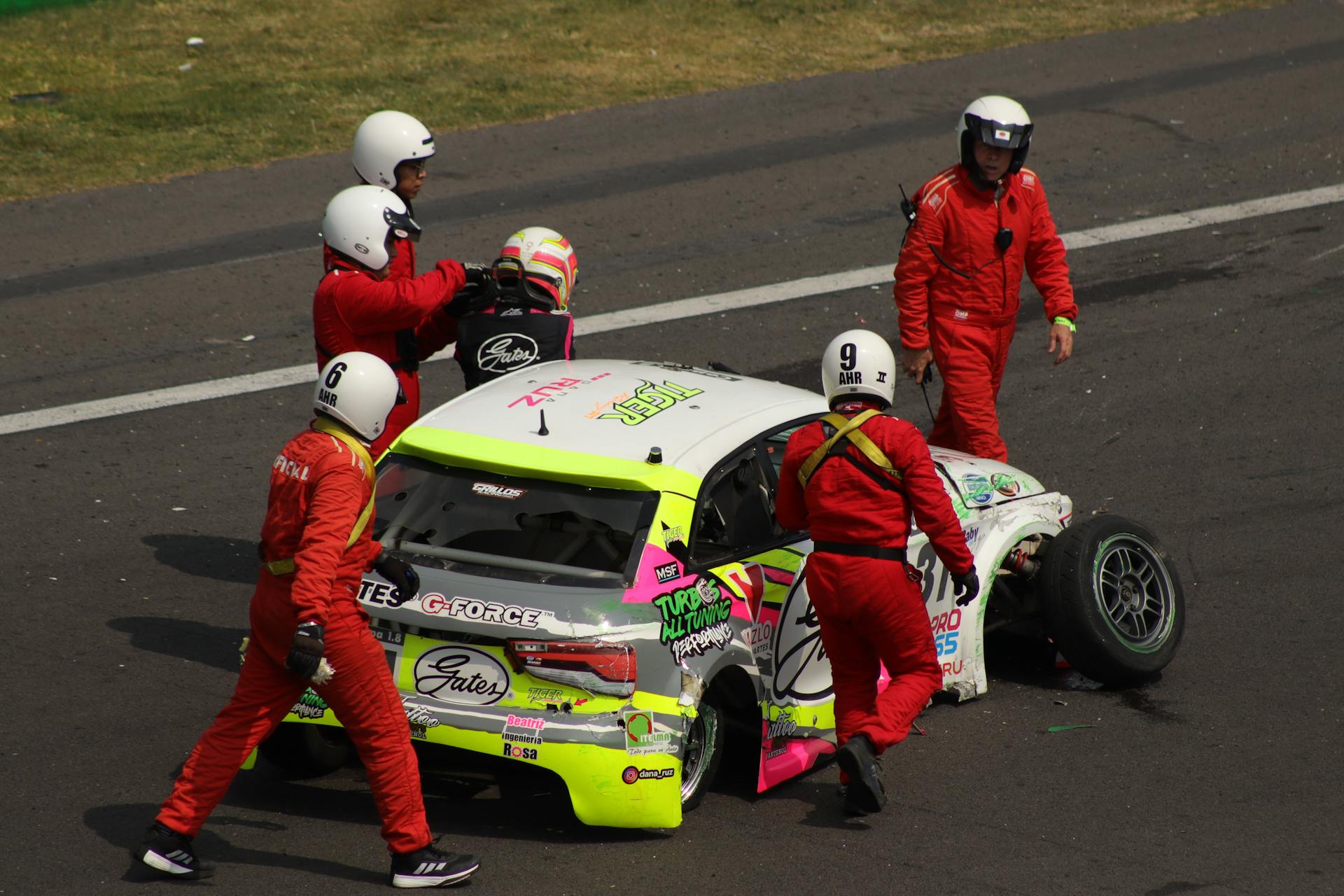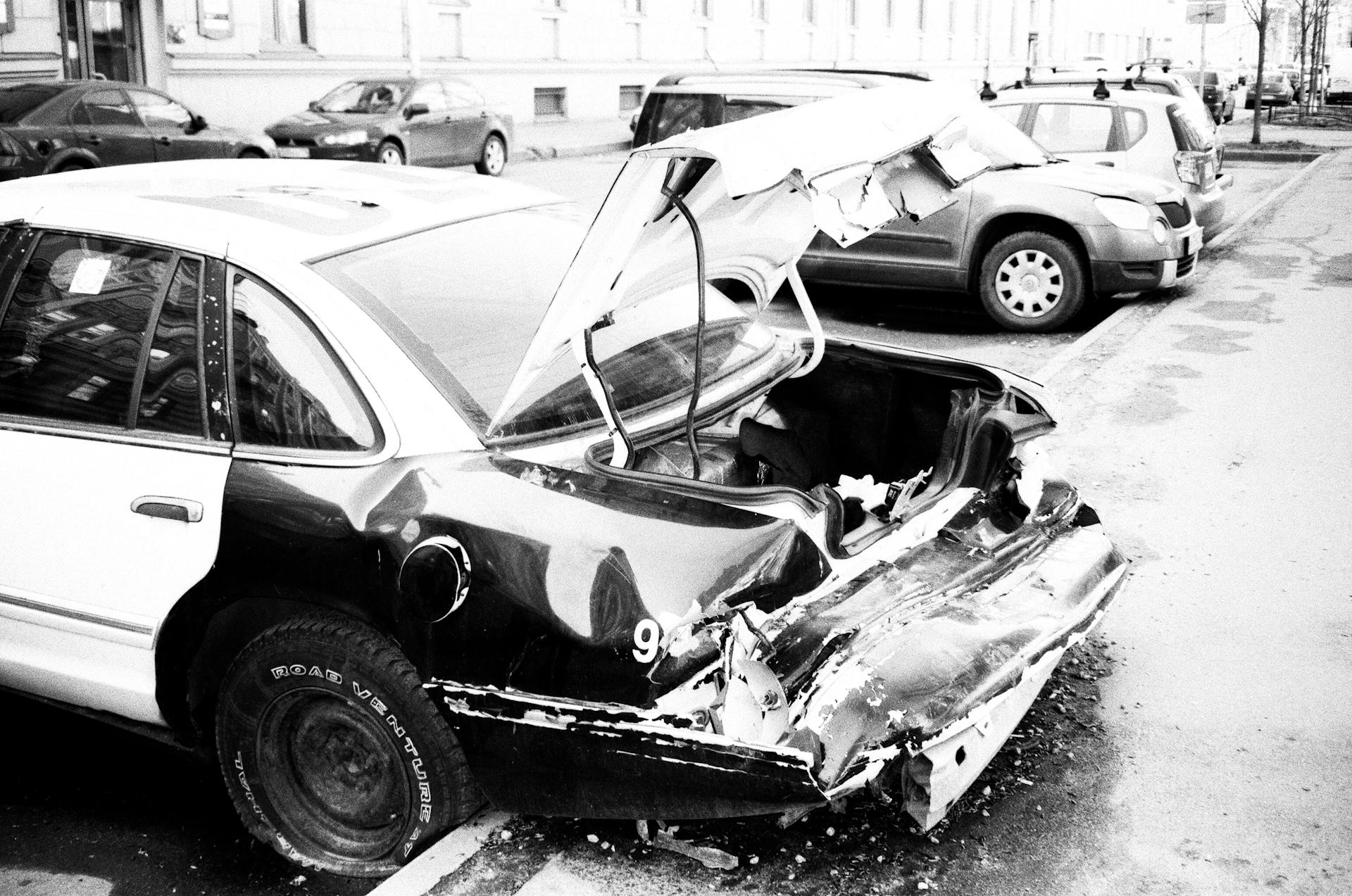
Collision damage waiver coverage is a type of protection that can save you from financial stress in case your rental car gets damaged. The cost of this coverage varies depending on the rental car company and the type of vehicle you rent.
If you don't purchase collision damage waiver coverage, you'll be responsible for paying for any damages out of pocket, which can be a significant expense. The average cost of a rental car is around $40 per day, but damages can easily exceed that amount.
Some rental car companies may offer a deductible option, which can lower your premium but increase your out-of-pocket expenses in case of a claim. This can be a good option if you're a careful driver or plan to rent a car for an extended period.
What is CDW Coverage?
CDW coverage is a type of protection that shields you from paying for repairs or excess fees if the rental car is damaged or stolen.
The excess level on car hire insurance can be high, which means you may have to pay a lot of money if the car is damaged or stolen.
CDW coverage can be purchased as a supplement from the car-rental company, but technically it's not insurance - it's a waiver that reduces the deductible.
This coverage usually excludes the undercarriage, roof, tires, windshield, windows, interior, and side mirrors.
CDW vs Other Options
CDW stands for Collision Damage Waiver, and it's essential to understand its differences from other options.
The excess level on car hire insurance can be high, which means you may have to pay a lot of money if the car is damaged or stolen.
A CDW can protect you from having to pay for repairs or excess fees, but ensure you check the terms and conditions of the CDW - as the level of cover can vary from product to product.
CDW vs LDW
CDW stands for Collision Damage Waiver, and LDW stands for Loss Damage Waiver. The latter may include theft and accident coverage, but even some companies that refer to their offer as a “CDW” may include theft. Verify the terms of your rental.
CDW typically only covers damage to the rental vehicle, while LDW often includes theft and accident coverage. Be aware that some companies may have different terms for their CDW, so it's essential to review the policy carefully.
CDW can be a good option if you're willing to take on some financial risk, but LDW might be a better choice if you're not comfortable with the possibility of higher out-of-pocket costs.
Primary vs Secondary
Primary coverage is a type of insurance that kicks in right away, without you needing to file a claim with your personal car insurance policy first.
With credit cards that offer primary insurance coverage, you can submit an accident claim right away by calling the number on the back of your card.
This means you can get the help you need quickly, without having to deal with the hassle of filing multiple claims.
On the other hand, secondary coverage is when your credit card's insurance kicks in after you've already filed a claim with your personal car insurance policy.
Secondary coverage is often the case with most credit cards, so it's essential to check your policy to make sure you're covered.
If you don't have a personal auto insurance policy, secondary coverage may still kick in – but it's always best to double-check your policy.
Cost and Worth
The cost of a collision damage waiver can be a bit of a sticker shock, with prices ranging from $25 to $39 per day, depending on the rental company, location, and vehicle type.
Renting for a few days can increase your total cost by $100 or more. This is why it's essential to consider the cost and worth of a collision damage waiver.
Pricing varies depending on the rental company, location, or state you're renting in, the vehicle type, and other factors. To give you an idea, here are some quotes from three rental car providers across three locations for an economy car in June 2023:
If you don't have a credit card offering rental car coverage, a collision damage waiver could save you from having to pay the deductible on your personal car insurance policy. This can be a significant cost savings, especially if your deductible is substantial.
How CDW Works
CDW can be bought as a supplement from the car-rental company, which technically isn't insurance, but a waiver that reduces the deductible in case of damage.
The cost of CDW can range from $15 to $30 a day, and sometimes it's cheaper to pay for this coverage when booking than when picking up the car.
CDW usually covers most of the car in case of a collision, but excludes parts like the undercarriage, roof, tires, windshield, windows, interior, and side mirrors.
The deductibles can still be substantial, with most hovering at about $1,000 to $1,500, or more depending on the car type.
Some rental companies offer a second tier of coverage, called "super CDW" or "zero-deductible coverage", which can bring down the deductible to zero or near zero, but at an additional cost of $10 to $30 per day.
This extra coverage can provide peace of mind, especially for travelers who want to avoid the stress of a high deductible.
What CDW Covers
CDW covers a range of damages, including repairing the damage from a collision, theft of the vehicle or its parts, and potential loss of income due to the car needing to be repaired.
If you're in an accident, CDW can protect you from having to pay for repairs or excess fees, which can be high.
CDW generally costs between $15 and $30 a day, but sometimes it's cheaper when combined with theft/loss insurance as part of an inclusive rental rate.
The deductibles for CDW can still be substantial, ranging from $1,000 to $1,500 or more, depending on the car type.
Here's a breakdown of what CDW typically covers:
- Repairing the damage from a collision
- Theft of vehicle or parts of it
- Potential loss of income due to car needing to be repaired
Some rental companies may offer a "super CDW" or "zero-deductible coverage" option to buy down the deductible to zero or near zero, but this can be pricey, ranging from an additional $10 to $30 per day.
Rental Company and CDW
You can buy a CDW supplement from the car-rental company, which technically isn't insurance – it's a waiver that reduces the deductible in case of damage.
This option usually costs between $15 and $30 a day, and sometimes it's cheaper to pay for this coverage when you book than when you pick up the car.
The CDW coverage usually excludes the undercarriage, roof, tires, windshield, windows, interior, and side mirrors, and the deductibles can still be substantial, ranging from $1,000 to $1,500 or more.
Some rental companies offer a second tier of coverage, called "super CDW" or "zero-deductible coverage" to buy down the deductible to zero or near zero, but this is pricey, ranging from $10 to $30 per day.
If a CDW-inclusive rate seems too good to be true, it probably is, as the unwaived deductible is often high, ranging from $2,000 to $3,000, so you'll have to spend extra to buy the "super CDW" anyway to get the deductible down to a reasonable level.
Here's a comparison of the costs of buying CDW from the car-rental company versus other options:
Note that the cost of credit card rental car insurance varies from company to company, so it's essential to check with your credit card provider to see what's included in their coverage.
CDW and Insurance
CDW is not insurance, but rather a waiver that reduces the deductible in case of an accident.
The excess level on car hire insurance can be high, which means you may have to pay a lot of money if the car is damaged or stolen.
You can buy a CDW supplement from the car-rental company, which usually costs $15–30 a day.
CDW generally covers most of the car if you're in a collision, but usually excludes the undercarriage, roof, tires, windshield, windows, interior, and side mirrors.
If you choose not to get CDW, you must explicitly decline the optional coverage, or it may be included in the rental rate as a "basic" option.
Some European rental agencies quote "basic" rates that include CDW/theft coverage, but the unwaived deductible is often high, so you may need to buy the "super CDW" to get a reasonable deductible.
Here's a breakdown of what CDW typically covers:
- Repairing the damage from a collision
- Theft of vehicle or parts of it
- Potential loss of income due to car needing to be repaired
Your Personal Insurance
Your personal car insurance likely has similar coverage when renting a car, protecting any vehicle you're driving, no matter who's at fault in an accident.
Your insurance policy may only cover you up to a certain number of days, such as 30 days, and may not cover loss of use, towing fees, or the rental company's administrative expenses.
You should always call your insurance representative to find out how your coverage works when renting a car.
A CDW can reduce the risk of an incident being reported to your insurance and help you avoid paying your insurance's deductible if you damage the car.
If you're at fault in an accident and injure anyone or damage the other driver's vehicle, your insurance company will find out about the incident when the driver makes a claim.
A credit card with secondary coverage can also cover the deductible, which might be an alternative to purchasing a CDW.
How Insurance Work?
A collision damage waiver (CDW) provides drivers peace of mind by reducing the financial risk of renting a vehicle.
The CDW covers some or all of the costs related to the physical damage of the vehicle involved in a crash, including vandalism and sometimes weather-related events.
You'll pay an additional fee on top of the rental costs to cover the purchase of the insurance product, which is added as a daily or total charge to the agreement.
Should you need to claim, you'll need to speak with the insurance company and provide evidence.
The CDW may cover the cost of replacing the vehicle if it's stolen.
Insurance Cover
Insurance cover is a crucial aspect of car rental, and it's essential to understand what you're getting into. A collision damage waiver (CDW) can provide peace of mind by reducing the financial risk of renting a vehicle.
CDW typically includes coverage for repairing damage from a collision, theft of the vehicle or its parts, and potential loss of income due to the car needing to be repaired. This can be a lifesaver if you're involved in an accident or your rental car is stolen.
The cost of CDW can vary depending on the car's cost, with daily fees ranging from $15 to $30. Some rental companies offer a partial damage waiver or a damage waiver with a deductible, which can cost less but only partially pay for damages.
Here are the key things to know about CDW and insurance:
Liability coverage, on the other hand, isn't included in most credit card and/or rental car CDWs, which only cover damage to and/or theft of the rental car. If you're involved in an accident resulting in injury to another person, you probably won't be covered. Full liability protection comes with the rental company's insurance, which can cost around $8 to $25 per day.
Frequently Asked Questions
Does a damage waiver get refunded?
A damage waiver fee is non-refundable, meaning you won't get your money back even if no damage occurs. However, it's designed to protect you from unintentional damage costs.
Is a damage waiver enough?
A damage waiver provides limited protection, covering only the cost of repairs, whereas a loss damage waiver offers broader protection, including administrative fees and loss of use charges. Consider purchasing a loss damage waiver for comprehensive protection against rental car damages.
Sources
- https://www.investopedia.com/terms/c/collision-damage-waiver-cdw.asp
- https://www.rac.co.uk/drive/advice/legal/car-insurance-guide-what-is-a-cdw/
- https://www.cnbc.com/select/credit-card-car-rental-insurance-how-it-works-cards-that-have-it/
- https://www.ricksteves.com/travel-tips/transportation/car-rental-cdw
- https://www.progressive.com/answers/rental-car-collision-coverage/
Featured Images: pexels.com


